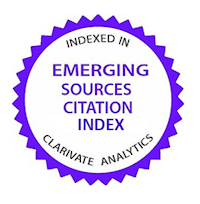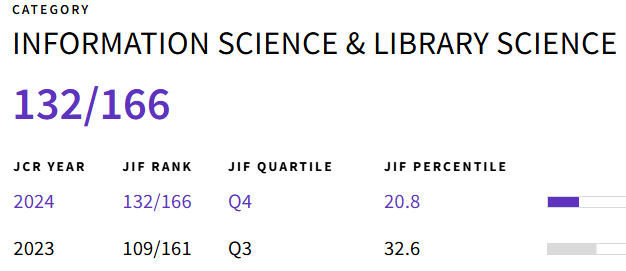Evaluation of Informational Literacy (IT) at the beginning and at the end of the degree in sciences and health sciences degrees of the University of Alcala and the role of the university library
Abstract
The management of current and reliable information in the scientific field is essential for the exercise of different professions. The main objective is to identify the impact of the training given by the UAH Library staff linked to the acquisition of informational skills by the university student. The methodology is based on a pre-post analytical study. The intervention was carried out with 1st grade students in the 2015-16 academic year and at the end of their studies in the 2020-21 academic year. The scope of the study was eight degrees in Sciences and Health Sciences from the UAH. The measurement was carried out through an anonymous questionnaire administered to the students, based on the previously validated and adapted survey instrument. Conclusion: the student body improves in informational skills at the end of the studies, although with some variability depending on the time and depth dedicated to said skills.
Downloads
Metrics
-
Abstract1029
-
PDF (Español (España))762
References
AREA MOREIRA, M; BORRÁS MACHADO, JOSÉ F. y SAN NICOLÁS SANTOS, B. “Educar a la generación de los Millennials como ciudadanos cultos del ciberspecio. Apuntes para la alfabetización digital. Revista de estudios de la Juventud, 2015, septiembre, nº 109, pág. 13-32. Disponible en: http://www.injuve.es/sites/default/files/cap1_109.pdf [Consultado 9 de noviembre de 2022]
AREA MOREIRA, M.; GUTIÉRREZ MARTÍN, A.; VIDAL FERNÁNDEZ, F. Alfabetización digital y competencias informacionales. Fundación Telefónica, Barcelona: Editorial, 2012. Disponible en: https://www.fundaciontelefonica.com/cultura-digital/publicaciones/161/ [Consultado 16 de diciembre de 2022]
ARROYO-VÁZQUEZ, N., y GÓMEZ-HERNÁNDEZ, J.-A. La biblioteca integrada en la enseñanza universitaria online: situación en España. Profesional de la información, 2020, vol.29, nº4. Disponible en: https://doi.org/10.3145/epi.2020.jul.04 [Consultado 9 de noviembre de 2022]
CABERO-ALMENARA, J. y PALACIOS-RODRÍGUEZ, A. Marco Europeo de Competencia Digital Docente «DigCompEdu». Traducción y adaptación del cuestionario «DigCompEdu Check-In». Edmetic, 2019, vol.9, nº1, p.213-234. Disponible en: https://doi.org/10.21071/edmetic.v9i1.12462 [Consultado 9 de noviembre de 2022]
DOLORS JUVINYÀ-CANAL, ROSA SUÑER-SOLER,ADELA BOIXADÓS PORQUET, MARION VERNAY, HERVÉ BLANCHARD AND CARME BERTRAN-NOGUER. Health Literacy among Health and Social Care University Students. International Journal of Environmental Research and Public Health, 2020, vol.17, p.2273. Disponible en: https://www.mdpi.com/1660-4601/17/7/2273. [Consultado 16 de diciembre de 2022]
DOMÍNGUEZ-AROCA, M.I. La biblioteca y las competencias informacionales en el currículo de los estudiantes de Ciencias, Medicina y Ciencias de la Salud de la Universidad de Alcalá. El Profesional de la información, 2017, vol.26, nº3, p.516. Disponible en: http://profesionaldelainformacion.com/contenidos/2017/may/18.html [Consultado 5 de noviembre de 2022]
DOÑATE, A., GARCÍA BRUSTENGA, G., GÓMEZZ CARDOSA D.R. Los jóvenes y los contenidos digitales, una relación en movimiento. Blog del eLearning Innovation Center. Universitat Oberta de Catalunya. 25 de noviembre de 2022. Disponible en: https://blogs.uoc.edu/elearning-innovation-center/es/los-jovenes-y-los-contenidos-digitales-una-relacion-en-movimiento/ [Consultado 16 de diciembre de 2022]
FAIN, M. Assessing Information Literacy Skills Development in First Year Students: A Multi-Year Study. The Journal of Academic Librarianship, 2011, vol.37, nº2, p.109-119. Disponible en: https://doi.org/10.1016/j.acalib.2011.02.002 [Consultado 5 de noviembre de 2022]
GONZÁLEZ-FERNÁNDEZ-VILLAVICENCIO, N.; DOMÍNGUEZ-AROCA, M.I. y CALDERÓN-REHECHO, A. State of the Art of Information Literacy in Spanish University Libraries and a Proposal for the Future. Paper presented at the1st European Conference on Information Literacy, ECIL 2013; Istanbul; Turkey; 22-25 October 2013. Worldwide Commonalities and Challenges in Information Literacy Research and Practice. Switzerland: Springer International Publishing, vol. 397, pp. 288-294. Print ISBN 978-3-319-03918-3. Online ISBN 978-3-319-03918-0. Series title: Communications in Computer and Information Science. DOI: 10.1007/978-3-319-03919-0_37. http://link.springer.com/book/10.1007/978-3-319-03919-0 (Volumen completo). Disponible en: http://link.springer.com/chapter/10.1007%2F978-3-319-03919-0_37 [Consultado 16 de diciembre de 2022]
GONZÁLEZ-LÓPEZ, J.R. y RODRÍGUEZ-GÁZQUEZ, M.L.A. Do health literacy levels of nursing students change throughout the study programme? A cross-sectional study. British Medical Journal Open. 2022 Jan 12; vol.12, nº1: e047712. DOI: 10.1136/bmjopen-2020-047712. PMID: 35022165; PMCID: PMC8756281
HEALTH LIBRARIES GROUP. Teaching and Learning in Action. Health Information & Libraries Journal, 2018, nº35, pp. 256–261. DOI: 10.1111/hir.12220.
HEREDIA SÁNCHEZ, F. Innovación y alfabetización mediática e informacional (AMI) en las bibliotecas, recursos, propuestas y tendencias. Boletín de la Asociación Andaluza de Bibliotecarios, 2021, vol.36, nº212. Disponible en:
https://dialnet.unirioja.es/servlet/articulo?codigo=8031871[Consultado 5 de noviembre de 2022]
HERNÁNDEZ RAMOS, J.P., MARTÍNEZ ABAD, F., OLMOS MIGELÁÑEZ, S., RODRÍGUEZ CONDE, M.J. Evaluación de competencias informacionales con el instrumento IL-HUMASS escalamiento multidimensional. Revista iberoamericana de diagnóstico y evaluación psicológica, 2016, vol.2, nº42, p.39-48. Disponible en: https://www.aidep.org/sites/default/files/articles/R42/Art4.pdf [Consultado 5 de noviembre de 2022]
KAVŠEK, T., PEKLAJ, C. y ŽUGELJ, U. Information Literacy Training Evaluation: The Case of First Year Psychology Students. The Journal of Academic Librarianship, 2016, 42(4), 293-299.
KURBANOGLU, S. y DOGAN, G. Information Literacy Competencies of LIS Students: The case of Turkey. 1st European Conference on Information Literacy, ECIL 2013; Istanbul; Turkey; 22-25 October 2013. Disponible en: http://www.bby.hacettepe.edu.tr/akademik/guledadogan/ECIL2013_sk-gd.pdf [Consultado 5 de noviembre de 2022]
JULIEN, H., GROSS, M., y LATHAM, D. Survey of information literacy instructional practices in U.S. Academic libraries. College & Research Libraries, 2018, vol.79, nº2, p.179-199. Disponible en: https://crl.acrl.org/index.php/crl/article/view/16606/18601 [Consultado 5 de noviembre de 2022]
LOCKHART, J. Measuring the application of information literacy skills after completion of a Certificate in Information Literacy. South African Journal of Libraries and Information Science, 2015, vol.81, nº2. Disponible en: https://sajlis.journals.ac.za/pub/article/view/1567
[Consultado 5 de noviembre de 2022]
MAHMOOD, K. Reliability and validity of self-efficacy scales assessing students' information literacy skills A systematic review. Electronic Library, 2017, vol.35, nº5, p.1035-1051.
MANSO-PEREA, C; CUEVAS-CERVERO, A. Y GONZÁLEZ-CERVANTES, S. Competencias informacionales en los estudios de Grado de Enfermería: el caso español. Revista Española de Documentación Científica, 2019, vol. 42, nº1. Disponible en: http://redc.revistas.csic.es/index.php/redc/article/view/1035/1672 [Consultado 23 de octubre de 2022]
PINTO MOLINA, M. Design of the ILHUMASS survey on information literacy in higher education: A self-assessment approach. Journal of Information Science, 2019, vol.36, nº1, p.86- 103.
PINTO MOLINA, M., FERNÁNDEZ-PASCUAL, R., GÓMEZ-HERNÁNDEZ, J.A., CUEVAS, A., GRANELL, X., PUERTAS, S., GUERRERO, D., GÓMEZ, C., & PALOMARES, R. Attitudes toward information competency of university students in social sciences. Portal: Libraries and the Academy, 2016, vol.16, nº4, p.737-761. Disponible en: http://dx.doi.org/10.1353/pla.2016.0050 [Consultado 23 de octubre de 2022]
REDECKER, C. Marco Europeo para la Competencia Digital de los Educadores. DigComEdu. Traducido por la Fundación Universia e INTEF en nombre del Ministerio de Educación y Formación Profesional, del documento en inglés “European Framework for The Digital Competence of Educators: DigCompEdu”. Centro Común de Investigación de la Comisión Europea, 2020, EUR 28775 EN, ISBN 978-92-79-73494-6, doi:10.2760/159770, JRC107466, http://europa.eu/!gt63ch. Publicado por primera vez en inglés como European Framework for the Digital Competence of Educators: DigCompEdu por el Centro Común de Investigación de la Comisión Europea – © Unión Europea, 2017.
ROWE, J., LEUZINGER, J., HARGIS, C. y HARKER K.R. The Impact of Library Instruction on Undergraduate Student Success: A Four-Year Study. College & Research Libraries, 2021, vol. 82, nº 1. Disponible en: https://crl.acrl.org/index.php/crl/article/view/24750/32573 [Consultado 5 de noviembre 2022]
SANDERS, L., KURBANOGLU, S., BOUSTANY, J., DOGAN, G., & BECKER, P. Information Behaviors and Information Literacy Skills of LIS Students. Journal of Education for Library and Information Science, 2015, vol.56, S1, p. S80-S99.
SHAO, X. R., & PURPUR, G. Effects of information literacy skills on student writing and course performance. Journal of Academic Librarianship, 2016, vol.42, p.670–678. Disponible en: https://doi.org/10.1016/j.acalib.2016.08.006 [Consultado 5 de noviembre de 2022]
SENG C., CARLON M.K.J.J. y CROSS J.S. Information literacy training effectiveness on Cambodia's province-based undergraduates. International Journal of Comparative Education and Development, 2020, vol.22, nº4, p. 263-280. DOI: 10.1108/IJCED-11-2019-0057 Disponible en: https://www.scopus.com/inward/record.uri?eid=2-s2.0-85090309117&doi=10.1108%2fIJCED-11-2019-0057&partnerID=40&md5=c992ad43cdcb971b663fc471e0b6c135 [Consultado 5 de noviembre de 2022]
WILSON, C., GRIZZLE, A., TUAZON, R., AKEMPONG, KWAME y CHEUNG, C.K. Alfabetización Mediática e Informacional. Currículum para Profesores. UNESCO. 2011.
Disponible en: https://unesdoc.unesco.org/ark:/48223/pf0000216099/PDF/216099spa.pdf.multi [Consultado 5 de noviembre de 2022]
WISHKOSKI, R., LUNDSTROM, K., y DAVIS, E. Librarians in the Lead: A Case for Interdisciplinary Faculty Collaboration on Assignment Design. Communications in Information Literacy, 2018, vol.12, nº2, p.166-192. Disponible en: https://doi.org/10.15760/comminfolit.2018.12.2.7 [Consultado 23 de octubre de 2022]

This work is licensed under a Creative Commons Attribution 4.0 International License.
Las obras que se publican en esta revista están sujetas a los siguientes términos:
1. El Servicio de Publicaciones de la Universidad de Murcia (Editum) conserva los derechos patrimoniales ('copyright') de las obras publicadas, y favorece y permite la reutilización de las mismas bajo la licencia de uso.
2. Las obras se publican en la edición electrónica de la revista bajo la licencia Creative Commons Atribución Internacional CC BY 4.0. Se puede copiar y redistribuir el material en cualquier medio o formato y remezclar, transformar y crear a partir del material para cualquier finalidad, incluso comercial.






